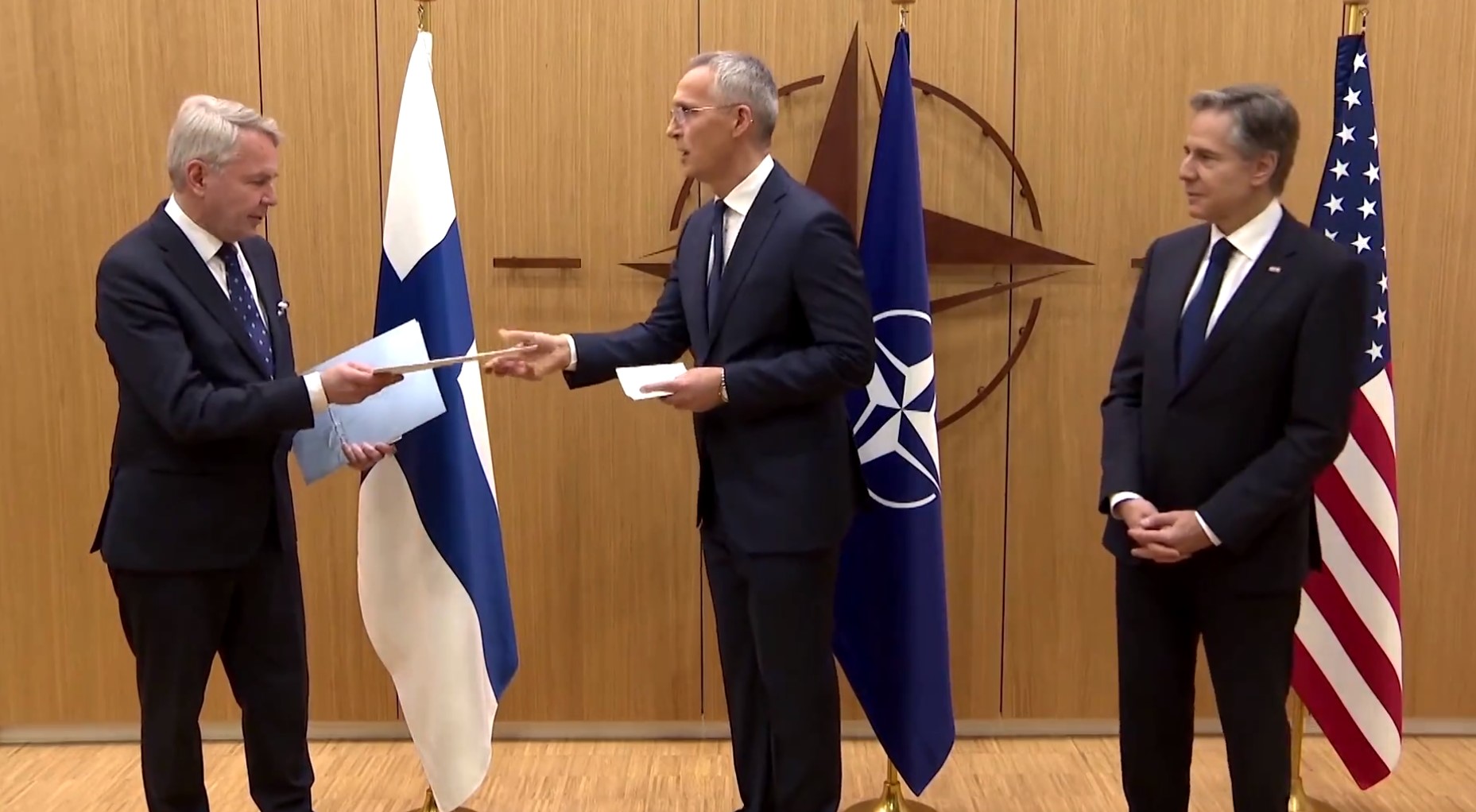Finland joins NATO in move Moscow says increases risks of wider conflict

Finland has become the 31st member of Nato after its foreign minister, Pekka Haavisto, signed an accession document and handed it to the US secretary of state, Antony Blinken, at a ceremony in Brussels.
- Sergei Shoigu, Russia’s defence minister, said the accession of Finland increased the risks of wider conflict.
- A Ukrainian soldier pleaded “partly guilty” on Tuesday at Russia’s first trial for war crimes in connection with its military campaign in Ukraine.
- Russian investigators formally charged Darya Trepova, a 26-year-old woman, with terrorism offences over the killing of the pro-war military blogger Vladlen Tatarsky in a bomb blast in St Petersburg.
- Alexander Lukashenko, the leader of Belarus, will travel to Moscow on Wednesday for two days of talks with the Russian president, Vladimir Putin, the Kremlin has said.
- Lithuania’s parliament decided on Tuesday to ban Russian nationals from purchasing real estate in the Baltic country, citing risks to national security.
- Polish farmers are threatening to derail a visit to Warsaw by Ukraine’s president, Volodymyr Zelenskiy, over claims that Ukrainian grain is flooding their market, in a move that would provide Russia with valuable evidence of a crack in western solidarity.
- Russia’s state-owned Tass news agency has reported that the number of people injured in the St Petersburg cafe explosion that killed the prominent military blogger Vladlen Tatarsky has risen to 40.
Reuters reporters have spoken to Finns living close to the Russian border about their thoughts of Finland’s new Nato membership. Below you can read an excerpt of their reports.
“I feel it’s a good thing that Finland is joining Nato. We have been here next to Russia for ages,” said Outi Lehtimaki, 59, a designer in Helsinki. “My father was in the war with the Russians so this is like a personal thing to me.”
Senja Veihlanen, a 25-year-old baker said: “In some ways I think it will make Finland a safer place but then again we don’t know what Russia will do. It’s a big question for me.”
In Virolahti, near the Russian border due east of Helsinki, retired Finnish combat engineer Ilkka Lansivaara had hung his own Nato flag from the side of his house.
“It’s a special day for Finland,” said Lansivaara, 70, a former soldier whose father was an air force pilot during the second world war. “Now we have power also behind us, not just our own forces,” he added.
Matti Seppala, 78, a retired warehouse worker who grew up near the border said joining would bolster Finland’s security even if he was not scared of Russian “sabre rattling”.
“I supported joining, you never know with the big brother, what they will do,” he said.
In Vaalimaa, once a busy crossing point for Finns and Russians almost midway between Helsinki and St Petersburg, border guard Markus Haapasaari watched the now just slow trickle of traffic. Finland’s new status hadn’t sunk in for him yet, he said.
The Ukraine invasion, which Moscow calls a “special military operation”, has led both Finland and Sweden to abandon decades of military non-alignment and seek safety in the Nato camp.
The accession of Finland with its 1,300-km (810-mile) border with Russia roughly doubles Nato’s land frontier facing Moscow at a time when east-west relations have hit their lowest point in decades.
Across the border in St Petersburg, a Russian resident of the city who gave his name only as Nikolai said, “Finland is making problems for itself by joining (Nato) … we used to consider it a brotherly country of the capitalist world, the closest to us in spirit, in relations, in mutually-beneficial economic relations. But now we will consider it as a state that is unfriendly to us.”
Ruled by czarist Russia for more than a century, Finland gained independence in 1917. It then desperately fended off a Soviet invasion in 1939 and for a time sided with Nazi Germany in a bid to win back lost territory.
As the war ended with allied victory, Finland found itself compelled to spend decades maintaining friendly and accommodating relations with its eastern neighbour and treading a sometimes precarious path of neutrality through the cold war.
Memories of Finland’s close relations with Moscow to preserve independence – a tactic known as “Finlandisation” – run deep for many Finns.








